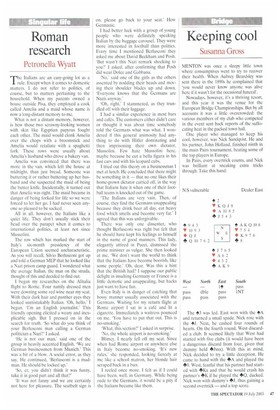Roman research
Petronella Wyatt
The Italians are an easy-going lot as a rule. Except when it comes to domestic matters. I do not refer to politics, of course, but to matters pertaining to the household. When my parents owned a house outside Pisa, they employed a cook called Amelia and a maid whose name is now a long-distant memory to me.
What is not a distant memory, however, is how those two scrawny-looking women with skin like Egyptian papyrus fought each other. The maid would clank Amelia over the chops with a broomstick and Amelia would retaliate with a spaghetti fork. These rows were usually about Amelia's husband who drove a bakery van.
Amelia was convinced that there was more in the van, which left the house at midnight, than just bread. Someone was buttering it or rather buttering up her husband and she suspected the maid of being the butter knife. Incidentally, it turned out that Amelia was right. The maid became in danger of being forked for life so we were forced to let her go. I had never seen anyone so pleased to be sacked.
All in all, however, the Italians like a quiet life. They don't usually stick their head over the parapet when it comes to international politics, at least not since Mussolini.
The row which has marked the start of Italy's six-month presidency of the European Union seemed uncharacteristic. As you will recall, Silvio Berlusconi got up and told a German MEP that he looked like a Nazi prison camp guard. I wondered what the average Italian, the man on the strada, thought of this and decided to find out.
I began my researches on the Alitalia flight to Rome. Four nattily dressed men were downing some red wine near my seat. With their dark hair and panther eyes they looked unmistakably Italian. 'Oh, hello,' I began. 'I'm an English journalist.' This friendly opening elicited a weary and inexplicable sigh. But I pressed on in the search for truth. 'So what do you think of your Berlusconi man calling a German politician a Nazi?' I asked, 'He is not our man,' said one of the group in heavily accented English. 'We are German businessmen from Munich.' This was a bit of a blow. A social error, as they say. He continued, 'Berlusconi is a madman. He should be locked up.'
`So, er, you didn't think it was funny, take it in good part and all that?'
'It was not funny and we are certainly not here for pleasure. The seatbelt sign is on, please go back to your seat.' How Germanic.
I had better luck with a group of young people who were definitely speaking Italian by the baggage carousel. They were more interested in football than politics. Every time I mentioned Berlusconi they asked me about David Beckham and Posh. 'But wasn't this Nazi remark shocking to you?' I asked, after confirming that Posh did wear Dolce and Gabbana.
'No,' said one of the girls as the others assented by nodding their heads and moving their shoulder blades up and down. 'Everyone knows that the Germans are Nazis anyway.'
'Oh, right,' I stammered, as they trundled off with their luggage.
I had a similar experience in most bars and cafés. The customers either didn't care or thought it was about time somebody told the Germans what was what, I wondered if this general animosity had anything to do with Hitler dominating and then imprisoning their own dictator, Mussolini. Few hate Mussolini here, maybe because he cut a bella figura in his fast cars and with his leopard cubs.
I tried out this theory on a businessman I met at lunch. He concluded that there might be something in it that no one likes their home-grown dictator carried off, in the way that Italians hate it when one of their football teams is knocked out of the game.
'The Italians are very vain. Then, of course, they find the Germans unappealing because they drink beer all day, eat heavy food which smells and become very fat.' I agreed that this was unforgivable.
There was only one dissenter, who thought Berlusconi was right but felt that he should have kept his feelings to himself in the name of good manners. This lady, elegantly attired in Pucci, dismissed the prime minister as vulgar. She then looked at me. 'We don't want the world to think that the Italians have become boorish, like some people.' Oh, dear. Was this a hint that the British had? I suppose our public delight in insulting Germany or France is a little demotic and unappealing, but hacks just want to have fun.
Even Italy is in danger of catching that bossy manner usually associated with the Germans. Waiting for my return flight at Rome airport I sat in a café and lit a cigarette. Immediately a waitress pounced on me. 'You have to put that out. This is no-smoking.'
'What, this section?' I asked in surprise.
'No. the whole airport is no-smoking.'
Blimey. I nearly fell off my seat. Since when had Rome airport or anywhere else in Italy become no-smoking. It's new rules,' she responded, looking fiercely at me like a school matron, her blonde hair scraped back in a bun.
I reeled once more. I felt as if I could have been, well, in Germany. While being rude to the Germans, it would be a pity if the Italians became like them.


























































 Previous page
Previous page